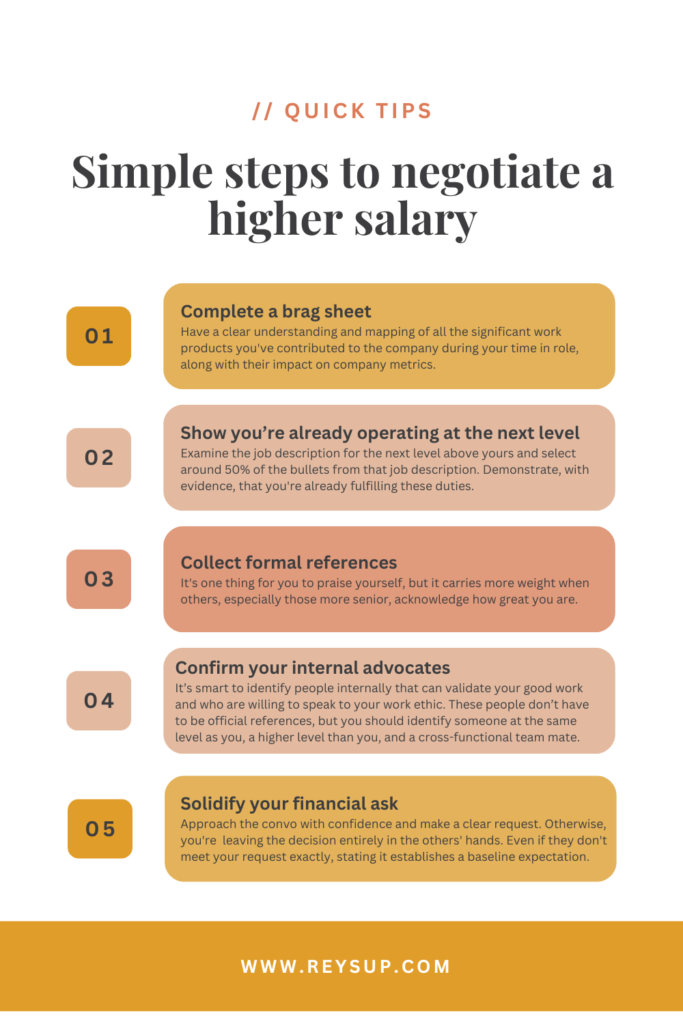This article is all about tactics to negotiate a higher salary. We talk about the prep, the delivery, and the expected outcome.
Negotiating your salary is often something that causes people a lot of stress and anxiety. In fact, many people just avoid it altogether because they either 1) don’t feel confident enough that their contributions warrant a salary increase or they 2) simply don’t know how to make the ask.
This trend is especially noticeable among individuals in their 20s and 30s, and yes, you guessed it, it’s more common among women. I think there are two main reasons for this.
- Firstly, if you’re in your 20s or 30s, chances are you’re in an entry-level or middle management position. People in these roles may be more prone to imposter syndrome, feeling like they haven’t led enough major projects or teams like their more senior colleagues, and thus feeling undeserving of a raise.
- Secondly, younger employees may be newer to their roles compared to their more seasoned counterparts, and they may have this notion that they haven’t built up enough ‘political capital’ internally to confidently ask for a raise and fear how they’ll be perceived.
Want my honest opinion on these reasons? I think they’re crap. My motto has always been: you should always ask for what you deserve. If you’re consistently going above and beyond in your role, delivering strong business results, boosting team morale, and tackling extra projects, you deserve recognition. It shouldn’t matter if someone’s older or has more experience. What matters is your performance and contribution. What matters are the facts. With that, I am going to teach you some simple steps that you can take to negotiate a higher salary and get what you deserve.

Negotiate a higher salary: Timing
Timing is important. And honestly, the best time to ask for a salary or level increase is during designated performance evaluation cycles. Most tech companies will run performance evaluations either at mid-year or end-of-year, it just depends on the HR department. Regardless of whether your company does one or both, it’s usually best to save conversations for raises or leveling adjustments to end-of-year because that is typically when finance sets aside the most amount of budget.
That said, if you really have a burning desire to talk to your lead about your level / salary, and you have done your homework as outlined in this article, I also think it’s completely fair to schedule a one-off meeting. Just make sure you give your manager a heads up of what you want to discuss.
Negotiate a higher salary: Prep Work
Preparing for your salary negotiation conversation is like preparing for an interview. You must do the up-front legwork or you probably won’t see the results you want to see.
Also Read 3 Simple Steps to Determine If You’re an Over-Performer
5 Steps to Take To Prepare For Your Conversation With Your Boss

Complete your brag sheet
- Before entering the conversation, it’s crucial to have a clear understanding and mapping of all the significant work products you’ve contributed to the company during your time in role, along with their impact on company metrics.
- List out items like historical goal attainment, deals/negotiations won, projects completed, work products delivered, and cross-functional team involvement. When you do, ensure to:
- Include the date of completion
- Describe the situation or context
- Clearly outline the action you took
- Highlight the impact, tying it back to changes in the core metrics your company values
- Pull up the job description of your current role and make sure that each bullet point is at least addressed with one piece of evidence that you provided above. Remember, it’s imperative to show that you are doing everything that has been asked of you and that you are doing it extremely well.
Show how you are already operating at the next level
- Similarly to the above, examine the job description for the next level above yours. You can obtain this from your manager or HR department. If your company doesn’t provide one, make an educated guess about the responsibilities someone at the level above you might have compared to yours.
- Select around 50% of the bullets from that job description and demonstrate, with evidence similar to the previous bullet points, that you’re already fulfilling these duties.
- You don’t need to check off every item on the list (since you’re requesting an adjustment to this level and the idea is that you will grow into it over time). The crucial point is to demonstrate to your manager that you’re already well on your way there.
Collect formal references
- This step isn’t mandatory, but I’ve always found it to have a positive impact. It’s one thing for you to praise yourself, but it carries more weight when others, especially those more senior, acknowledge how great you are.
- For tips on how to ask for references, check out our other article here.
Confirm your internal advocates
- This is similar to the above, but slightly different. When you are about to ask for more money, it’s always helpful to ensure that there are people internally within the company that can validate your good work and are willing to speak to your work ethic.
- These people don’t have to be official references, but you should identify at least one of the following people in each department that (if asked) would support your case.
- Someone on your team that is at the same level as you
- Someone on your team that has a higher level than you
- Someone on each main cross-functional team you engage with on a regular basis
- Someone that is a Director level
- Reason being, it’s always helpful to have a senior leader that supports you case
Solidify your financial ask
- It’s crucial to approach the conversation with confidence and make a clear request. Otherwise, you’re essentially leaving the decision entirely in others’ hands. Even if they don’t meet your request exactly, stating it establishes a baseline expectation.
- When making your ask, consider the various components of a salary:
- Base salary
- A standard raise is typically anywhere from 5% to 15%. Asking for anything more than 15% may come off as excessive.
- Variable salary (if you’re commission-based).
- End-of-year bonus
- Equity
- Base salary
- When it comes to the financial pieces, it’s always best to have the details written on a cheat sheet or sticky note beforehand. That way, you don’t mess up the numbers.
- It’s also helpful to conduct some quick research on what similar roles at other companies pay. This way, you can enter the conversation from a position of knowledge, saying something like, “I know that the industry standard for this role is XXX.” Sites like Glassdoor or Indeed are great for compensation comparisons.
Negotiate a higher salary: Delivery
Once you have completed all of your prep work and aligned on the right time to make the ask, you are ready to actually negotiate a higher salary and have the conversation with your boss.
Below are some recommendations to ensure the conversation unfolds smoothly and you successfully negotiate a higher salary.
- Practice delivering your message with a partner or friend beforehand. Be concise in your language, keep emotions in check, and focus on presenting the facts.
- Avoid wavering in your conviction or using hesitant language like “I think.” Speak confidently to assert your expectations.
- There’s a subtle art to this part. It can be advantageous to leave the other party feeling a hint of anxiety. Anxious individuals tend to act more swiftly to avoid unfavorable outcomes. However, this doesn’t mean that you should directly state that you’ll seek alternative opportunities if your request isn’t met. Instead, just refrain from saying things like “I understand if you can’t match my request.” Maintaining a degree of ambiguity is key.
Negotiate a higher salary: Outcome
After your conversation, several outcomes are possible.
- Best case scenario: Your boss agrees, and you receive the raise.
- Your boss may acknowledge your request and indicate they need time to consider, which is the most likely response.
- Alternatively, your boss may deny your request or provide other information around why a salary raise can’t happen right now (ex: budgets are really tight). If this occurs, you’ll need to decide whether the job is still worth pursuing without the raise. Ask your boss if there’s an opportunity to revisit the raise discussion in six months and whether you’re willing to wait. Alternatively, search the internal job board to see if there is another open role on another team that will pay more. If not, it may be time to explore a new job and we can help you do that with our article here.
I hope this post has given you the framework you need to feel prepared and confident to negotiate a higher salary. Just remember to stay calm, focus on the facts, and know your worth. You’ve got this!




